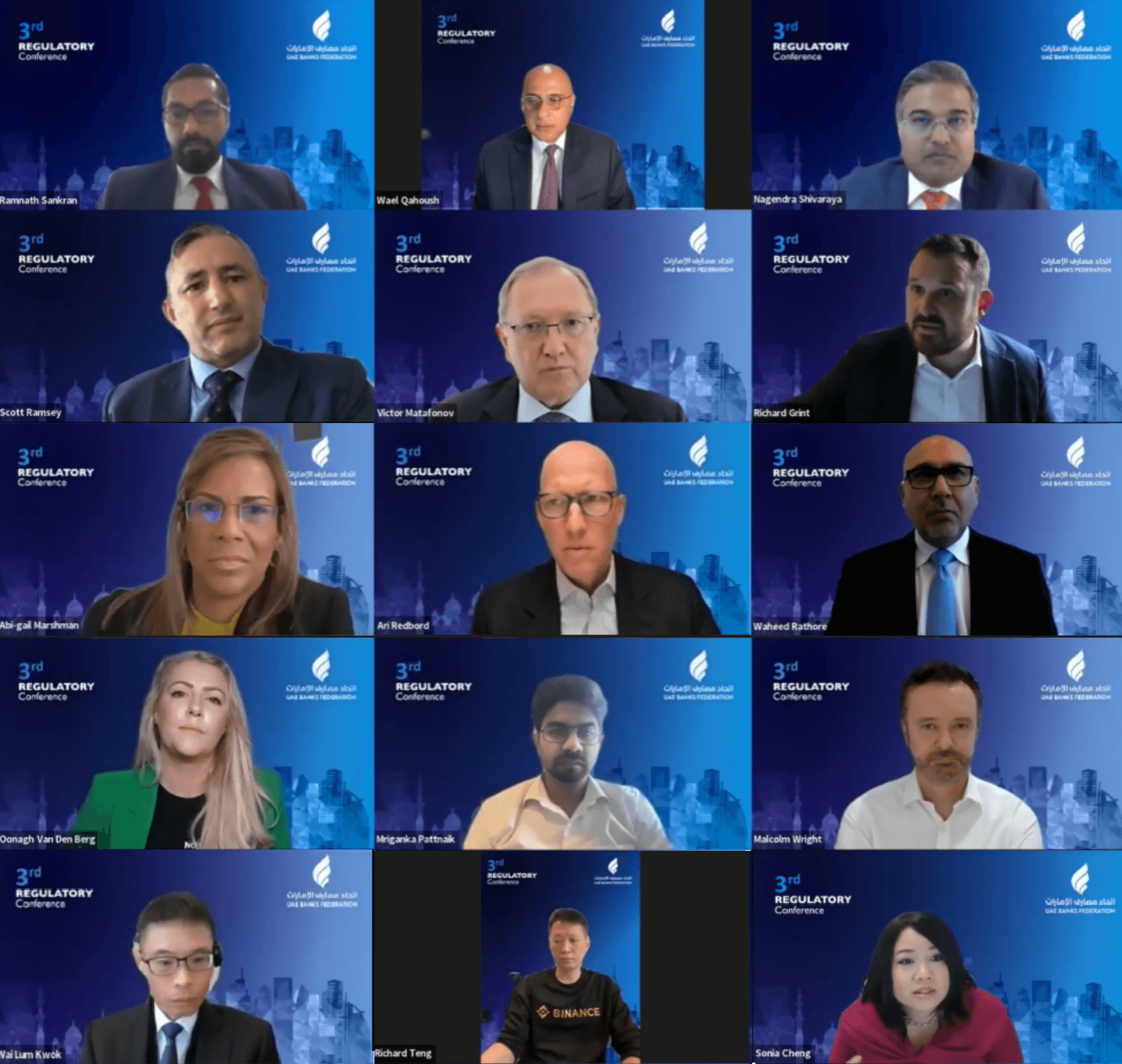


Abu Dhabi, United Arab Emirates; 12 September 2022:
UAE Banks Federation (UBF), the unified representative and voice of banks in the UAE, organised the third edition of the Regulatory Compliance Conference on 7 and 8 September 2022 to shed light on financial crimes and discuss key trends concerning the UAE’s financial and banking sector.
Several experts and executives from the sector attended the virtual conference, which addressed current issues and challenges. Discussions on the first day focused on the topic of financial crime in the context of the evolving digital landscape, while the future of the banking sector and its challenges were discussed on the second day.
In the opening session at the conference, Fatima Abdullah Al Jabri, Assistant Governor for Anti-Money Laundering Compliance - Market Conduct Regulation and Consumer Protection Department, gave a comprehensive presentation on the Financial Action Task Force (FATF) requirements and regulatory visions in the field of compliance.
Representatives from member banks, financial services institutions, financial technology companies and rating and consulting institutions also attended the annual conference.
His Excellency Abdulaziz Al Ghurair, Chairman of UAE Banks Federation, said, “The organisation of the third edition of the Regulatory Compliance Conference reflects the UAE Banks Federation’s commitment to continue its efforts to improve the framework and procedures required to develop and maintain compliance processes in line with the Central Bank of the UAE’s guidelines. This will improve the effectiveness of the country’s banking and financial system in managing risk, enhancing transparency and governance, and combating fraud and financial crime.”
His Excellency added: “The conference successfully brought together a wide range of banking and financial experts from around the world to discuss the latest developments in compliance and their impact on the sector. These deliberations lay the foundation for improving frameworks and strategic policies to ensure the application of compliance standards in the face of rapid developments that the banking sector is witnessing.”
The session focused on how local banks can comply with the Financial Action Task Force (FATF). The session was attended by Alex Irving, Group Compliance Head at First Abu Dhabi Bank; Victor Matafonov, Group Chief Compliance Officer at Emirates NBD and Chairman of UAE Banks Federation Compliance Committee; Scott Ramsay, Senior Executive Vice President - Group Head of Compliance and MLRO at Mashreq Bank; Nagendra Shivaraya, Managing Director, Head of Compliance at Standard Chartered Bank; Richard Grint, Senior Director of Forensics and Litigation at FTI Consulting; and Ari Redbord, Head of Legal and Government Affairs - TRM Labs and former advisor to the US Office of Foreign Assets Control (OFAC). The session was moderated by Wael Qahoush, Senior Vice President and Head of Compliance at First Abu Dhabi Bank - USA.
The second session focused on ways to expand the role of banks in dealing with new and emerging financial crime challenges and saw participation by Muzaffar Khan, Group Head of Compliance for Financial Crimes at First Abu Dhabi Bank; Waheed Rathore, Head of Group Compliance at Dubai Islamic Bank; Nishanth Nottath, Executive Vice President and Head of Anti-Money Laundering and Technology Oversight at Mashreq Bank; Andrew Kimbrough, Head of Compliance at SEBA Bank AG; Michael Wong, Head of Compliance and Financial Crime at Emirates NBD; and John Cusack, President of the Global Alliance Against Financial Crime and Editor and Founder of Financial Crime News. The panel was moderated by Abi-Gail Marshman, Senior General Manager and Head of Financial Crime Advisory at FTI Consulting, Inc.
The second day of the conference was dedicated to the future of the banking sector and its challenges. Several experts on currencies and digital assets participated in a panel discussion themed “New Technologies Helping to Shape the Future of Banking”. Participants included Malcolm Wright, Founder of InnoFi Advisory, Vice Chair of the Advisory Board and Co-Chair of the Digital Finance Working Group; Richard Teng, Regional Head of Binance for Currency and Digital Assets in the Middle East and North Africa; Matthew White, Partner and Head of Cybersecurity and Digital Assets at PwC; Deepa Raja Carbon, Vice President of Dubai Virtual Assets Regulatory Authority (VARA); Wai Lum Kwok, Senior Executive Director at ADGM Registration Authority; and the session was moderated by Oonagh van den Berg, CEO of the platform UPHOLD and founder of RAW Compliance.
Kevin Ludwick, Head of UPHOLD EUROPE, gave a presentation on the evolution of the compliance function. The panel discussion on ‘Shaping the future of the compliance function and its application by banks’ featured Anna Isaac, Vice President of Group Compliance at First Abu Dhabi Bank; Rasha Mortada, Chief Compliance Officer at Abu Dhabi Commercial Bank; Haseeb Ansari, Compliance Officer at Emirates Islamic Bank; and Shelley Schachter, Chief Compliance Officer - CEX.IO - UK.
Jamal Saleh, Director General of UAE Banks Federation, said, “The banking and financial sector in the UAE is committed to developing, adopting and adhering to the latest regulations and guidelines, especially in compliance, governance and transparency. We at UAE Banks Federation, under the direct supervision of the Central Bank of the UAE and in collaboration with member banks, are working to keep abreast of the latest laws and regulations in this area, encourage investment in digital infrastructure and develop cadres.”
He added, “Given the increasing risks faced by the banking and financial sector in the digital age, efforts to update legislation and continuously enact new laws are being accelerated to ensure safe banking for customers. As part of its efforts to create the appropriate conditions for adhering to compliance standards, the UAE Banks Federation, under the supervision of the Central Bank of the UAE, has taken a number of steps and initiatives to enhance the ability of banks and financial institutions in the country to deal with the risks facing the banking and financial sector in the country.”